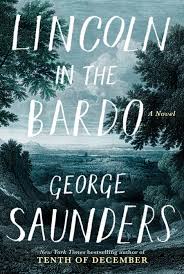
This article is a preview from the Spring 2017 edition of New Humanist. You can find out more and subscribe here.
Lincoln in the Bardo (Bloomsbury) by George Saunders
George Saunders is the most lauded short-story writer living today, revered in America to the point of canonisation. Among many other accolades, he has been awarded a Macarthur “Genius” Fellowship and named by TIME magazine, in a characteristic departure from reality, as one of the 100 most influential people in the world.
He rose to prominence in the UK in 2013 with publication of his short story collection The Tenth of December, a bright, brilliant firework of a collection, which received rave reviews and won the inaugural Folio Prize (now the Rathbones Folio Prize). This made his debut novel, Lincoln in the Bardo, one of the most anticipated books of 2017.
Saunders’s stories often follow a certain structure: refusing to explain their rules at first, they seem strange and impenetrable; gradually, a world recognisably like our own is revealed, but in some way estranged or uncanny; the story and its conventions begin to converge purposefully and forcefully; and finally, out of nowhere, we are hit with a wave of compassion, the very last thing we expected of an ostensibly experimental story. Even when we do learn to expect it, the sheer aching sympathy of his characters challenges you to be better, kinder, more humane.
Lincoln in the Bardo follows this same broad structure, charting one night in the graveyard where the young Willie Lincoln, son of Abe, has just been interred. Although Lincoln Sr features, it is really young Willie who is in the bardo, a Tibetan word for an intermediate state between lives in Buddhism, similar to the Christian limbo. None of the characters there are able to acknowledge that they are dead, delicately referring to “that previous place” and calling their coffins “sick-boxes” as if they are merely resting up for a return. All here are restless souls, snagged on some troubling detail of their past life like Williams the hunter, who sits caring for the great pile of animals he has killed.
There is a touching trio of elders – names deliberately written lower-case – who take Willie under their wing: roger bevins iii, a young gay man covered in eyes; hans vollman, who lugs around a “tremendous member”, having been taken ill while anticipating his marriage-bed; and the reverend everly thomas, who is adamant that this is no place for a child, and that Willie must depart as soon as possible, for whatever the next life holds. Except Willie won’t go. He is waiting for his father.
Writing Abraham Lincoln is like playing Hamlet – fraught by competing, contested interpretations, impossible to begin anew – and Saunders confronts the historicity of the novel with a polyphonic, argumentative chorus. Different observers tell us Lincoln’s eyes are “gray”, “gray-brown”, “bluish-brown”, “bluish-gray”, “blue”; he is both “the ugliest man I had ever seen” and, to another, “the handsomest man I ever saw”. Saunders is not reverent towards Lincoln, whom he depicts at one point riding his nag with his long legs hanging down like “some sort of man-sized insect”. But we do not hear Lincoln Sr’s testimony directly – we literally inhabit him, as roger bevins iii and hans vollman sit within him to understand his thoughts.
The novel is not, as is being suggested, a masterpiece, but it does reveal Saunders’s many great qualities, not least of which is the hard-won gift of empathy, and his emphasis on the importance of “kind little words, which are of the same blood as great and holy deeds”. It takes a couple of chapters to attune yourself to the clamour of voices, but the reward is a strange, wise novel, truer in its expression than many ostensibly historical novels, and a reassurance that America has survived a war with itself before.

